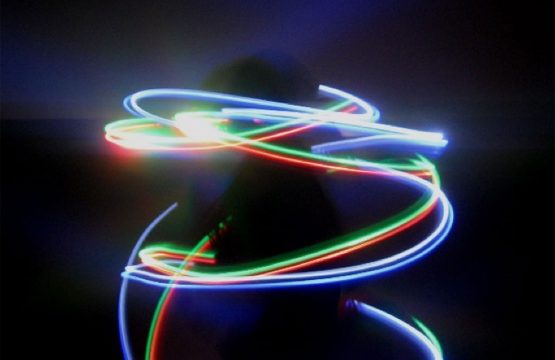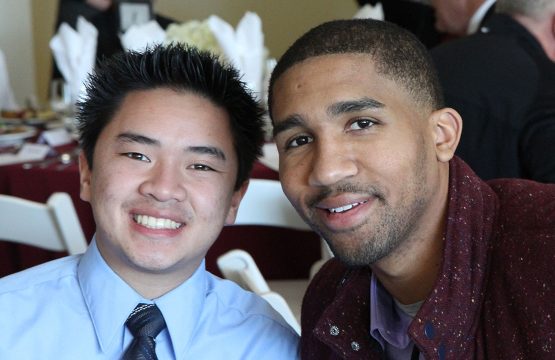Earth-Friendly Tips from the Tiger Woods Foundation’s Programs Team
California may have voted for a state-wide ban on plastic bags at grocery stores, but that’s certainly not the case across the nation. For Eric Moore, our Senior Director of Programs based in Washington D.C., he’s taken it upon himself to make purchases without plastic.
“Did you know 160,000 plastic bags are used every second around the globe? And that 5 trillion plastic bags are produced yearly? That’s over 700 bags per person, per year. Even though they are cheap and convenient, plastic bags are a major source of environmental pollution, causing the death of over 100,000 marine animals each year, in addition to being the product of fossil fuels (up to 100 million barrels of oil are needed to produce our yearly supply of bags). There is a better way!
I started by using reusable grocery bags and have since added reusable produce bags to my shopping arsenal. As an urban commuter, I am often wearing a backpack around the city, and for most purchases I try to decline the plastic bag and instead place the item in my backpack. This is not to say that I am perfect – I have not completely cut plastic bags out of my life – but small steps are still steps, and if most people took some measures to reduce the use of plastic bags we could have a significant, positive impact on the environment.”
Holly Dennard, our Lead Instructor, kept Mother Earth in mind when she made her latest big purchase.
“I recently bought a Chevy Volt, which is an electric car that can run solely on a charge or use gas. I have not put more than $30.00 worth of gas in it for the past 4 months!”
Alma Gutierrez, a Coordinator for the Earl Woods Scholar Program, is passionate about a lot of things—but recycling has been her passion since she was young.
“I love recycling! I was taught at a young age to recycle plastic or aluminum bottles or cans by my mother—although, I thought those were the only things you could recycle. That all changed when I studied abroad in Italy. In Florence, there are four bins that you need to properly dispose your items in or you get fined. I would enjoy recycling and separating our apartment items and it felt great that everyone in the city contributed to recycling. I love California, but I wish we had similar bins and people recycled as a whole. That is how we make a difference!
- Blue lid container: garbage that cannot be recycled
- Yellow lid container: paper (paper boxes, newspaper, office paper, etc., except very dirty paper and paper with plastic layers)
- Blue bell-shaped container for ‘multimateriale’: glass bottles, plastic bottles, plastic bags, Styrofoam, nylon, aluminum and other metal cans and Tetra-pak (milk containers, juice packs, etc.)
- Brown lid container with green sticker: organic (food matter of animal or vegetable provenance, garden waste, etc.)
With warm summer temps soon approaching, Melisa San Agustin, our Learning Facilitator, knows that keeping cool is a must, but we should be kind to the environment in the process.
“Rather than using the air conditioner, install or turn on the fan and keep the windows open to help circulate air throughout the house.”
A Senior Manager with the Earl Woods Scholar Program, Lea Segura knows that the water shortage in California is a very real problem. We may have received a good amount of rain this winter, but that doesn’t mean our drought days are behind us.
“In our household, we recycle the water from washing dishes and use it to water plants outside. Instead of throwing the soapy dish water down the drain, we pour the water into a bucket and take it outside to water the grass and plants.”
Speaking of plants, Senior Manager Nick Novack makes it a point to connect with the land on Earth Day.
“My wife and I plan to plant vegetables in our garden on Earth Day. It will be fun to have our own veggies and it is good for the earth, too. We have two young children so I feel for them to see where food comes from in a first-hand experience is important.”
Always thinking outside the box—or mailbox in this case—Denisse Jover, a Senior Manager with the Earl Woods Scholar Program, has a smart tip that is not only environmentally friendly, but prevents clutter in the house!
“In our household, we opt out of receiving our bills via snail mail. Not only does it help save trees and create less paper waste, it helps you stay organized online and not forget to pay for any bills!”
One of our newest TGR Learning Lab Learning Facilitators and a former employee of the Ocean Institute, Saki Hashimoto is a dedicated green queen.
“I try my best to always use a reusable water bottle and reusable bags—I keep them in my purse so I don’t forget. I use reusable coffee cups whenever possible. Some places offer discounts if you bring your own cup! I try to avoid using straws when restaurants give us water or drinks.
And a big one, that’s often overlooked, is palm oil. I avoid using products containing palm oil given that it’s connected to a lot of habitat destruction.
- Look for sustainable palm oil products. They usually have a stamp of approval somewhere on the product packaging.
- There are awesome apps out there that can help us when we are shopping!
Mehrab Sarwar, a Coordinator for the Earl Woods Scholar Program, recently relocated from our Anaheim office to our D.C. location. Leaving behind his car in California, Sarwar has become a friend of all forms of public transportation, doing his part to help keep our air clean.
“As a recent transplant to Washington D.C., taking public transportation has become an easy way for me to be more conscious of helping the environment. As a rider of the X2 bus, which runs from east of the Anacostia River to downtown D.C., the overcrowded yet wildly eccentric commuters always seem to provide the wake up that I need before going into the office.”
To learn more about my bus route and the X2 bus, check out these 24 tweets highlighted in the Washington Post.”
Our Facilities Senior Manager Barry Christy has some simple, green solutions to keep our houses and cars clean, our bellies happy and our planet healthy.
“Make your own household cleaners, it’s easy to do! I use vinegar and water in a spray bottle for cleaning around the house. Also, you can use baking soda and water to clean your battery terminals on your car battery. And for even tastier baked goods, search out local farms for fresh produce and dairy products.”
And we can’t forget about our 35,000-square foot building in Anaheim. Our TGR Learning Lab is equipped with close to forty state-of-the-art glass solar panels on our exterior, which generates plenty of surplus energy for the city.
There you go—a few Earth Day tips from our programs team to help keep this world shiny, bright, and clean. We hope you’ll do your part too!
Champions of the Unexpected.


